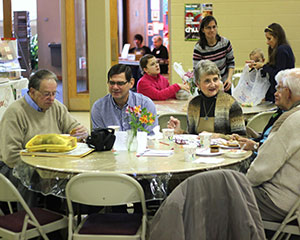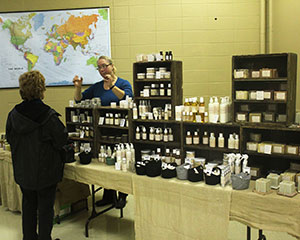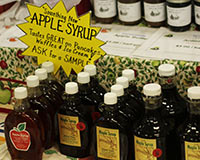“Our daily bread” is a common reference in Christian prayer and liturgy. But how often do Christians stop to think about where their daily bread comes from, and who is responsible for producing it? Don Filipiak, left to right, Jim Goddesne, Ingrid Filipiak, Joan Tarantino, (partially obscured) and John Tarantino dine on brunch using local foods at the Nov. 24 Markets & Meals for Hope market at Good Shepherd Church, Menomonee Falls. (Catholic Herald photo by Peter Fenelon)
Don Filipiak, left to right, Jim Goddesne, Ingrid Filipiak, Joan Tarantino, (partially obscured) and John Tarantino dine on brunch using local foods at the Nov. 24 Markets & Meals for Hope market at Good Shepherd Church, Menomonee Falls. (Catholic Herald photo by Peter Fenelon)
“We see our mission as to kind of remind people that food doesn’t just come out of factories and is not made by anonymous people and machines. It comes from farms,” said Tom Nelson, executive director of The Churches’ Center for Land and People. “And even an overproduced product has to start from the land. Almost everything that sustains us and provides us our daily bread comes from hardworking farmers and farm families.”
The Churches’ Center for Land and People (CCLP) is a non-profit organization that was founded by the Sinsinawa Dominican Sisters during the farm crisis of the 1980s. Active in the Madison and Milwaukee areas, the CCLP ministers to and advocates for small farms and farming families in rural Wisconsin communities.
One of the best ways to do that, said Nelson, is to bridge the gap between urbanites and the rural families who grow their food. To that end, for the past 10 years the CCLP has coordinated Winter Markets and Meals for Hope, weekly farmers’ markets and brunches held in the gathering spaces of places of worship in Madison and Milwaukee.
|
|
According to Nelson, the Markets and Meals for Hope are so much more than just a place to buy local produce; they also provide an invaluable opportunity for face-to-face encounters between the public and the farmers whose food sustains their daily life.
“We say we (CCLP) sort of stand on a three-legged milking stool – the stewardship of the earth … support and development of the community and community relations, and then justice,” said Nelson. “The prism of how we view these things is through our faith.
“As an ecumenical organization, we bring together the united Christian message, but we also have different ways of looking at it through the doctrines of our congregations, and we share that with one another.”
Nelson argued the Christian is obligated to see food issues in a different light than his or her secular brother.
“Food is not just about sustaining our body and gut, it’s also about sustaining our spiritual side. If we’re attuned to that and awake to that, (it affects) the whole development of our personal philosophy and how we eat and what we eat and who we eat with,” he said. “Food is … the original foundation of all relationships.”
The relationship between farmers and the communities they feed, he said, is often overlooked. Though not a farmer himself, Nelson, an artist who lives in the driftless area of Green County, has a respect for the agricultural community. A former rural life office coordinator for the Diocese of Madison, he advocates for the farming communities of Wisconsin, which he considers to be too often misunderstood or marginalized.
“One way or the other you have to work with rural people,” he said. “If all the farmers in the rural areas stop producing for a week, we’d all be hungry in a couple days.”
Sinsinawa Sr. Marie Louise Seckar has been involved with the CCLP since its founding, and since the 1990s has represented the Dominican community on the organization’s board. She agreed with Nelson about the importance of consumers meeting farmers face-to-face, and views the winter markets as an educational opportunity. Petra Ahnert, owner of Beehive Alchemy, talks with a shopper at the Nov. 24 Markets & Meals for Hope market at Good Shepherd Church, Menomonee Falls. Ahnert sells honey, body products and candles made from bee products. (Catholic Herald photo by Peter Fenelon)
Petra Ahnert, owner of Beehive Alchemy, talks with a shopper at the Nov. 24 Markets & Meals for Hope market at Good Shepherd Church, Menomonee Falls. Ahnert sells honey, body products and candles made from bee products. (Catholic Herald photo by Peter Fenelon)
“Getting to relate to producers at the markets reinforces the person behind the product. Making the personal connections in the market situation help bridge the relationship gap,” she said. “Just Saturday at one of our markets here, I observed how many folks were not just buying products but spending time talking with the producers, learning from them about bees and honey production and growing various foods.”
The fact that the markets take place in places of worship is appropriate, said Sr. Marie Louise, pointing out that Pope Francis and his predecessors have “pointed out the importance of care of creation and our justice obligations to those who grow our food.”
“Catholic social principles have long advocated this obligation promoting just relationships to both earth care and growers’ compensation for their labor. I think this needs to be preached more from our pulpits,” she said.
Another key aspect of the markets is that they provide farmers with a revenue stream during the off-season. Every market features vendors specific to that area, in the hopes they will create lifelong relationships between consumers and their local farmers.
The markets also feature brunches prepared with local food, which Nelson hopes will encourage people to “eat how our grandparents did … in season.”
“Coming together for a festive celebration of the meal at the markets also helps those who come enjoy meals from locally produced food and are more apt to consider purchases of locally grown food after a delicious meal,” said Sr. Marie Louise. “The markets and meals together help reinforce the idea that we are one community of producers and consumers.”
A percentage of the proceeds from the markets benefits the Harvest of Hope fund, which provides speedy relief to farm families in financial distress. Instead of the usual 60-day processing period, Harvest of Hope averages a 72-hour turnover time responding to financial emergencies with a gift of up to $1,000.
“I think so much of what we need to do is to reach out to others, and food is the number one gift we bring to the table, and our savior Jesus knew that,” said Nelson. “He gave some of his best teaching around food and at table.”

